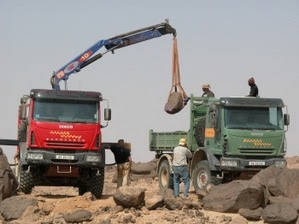Egypt
 easier.com
easier.com
See the above page for the full press release.
- Colloquium Overview: Recent Archaeological Fieldwork In Sudan
Egyptological (Dr Patricia Spencer) The 2012 all-day colloquium of the Sudan Archaeological Research Society (http://www.sudarchrs.org.uk/) was held in the Stevenson Auditorium of the British Museum on Monday 14 May. This annual event concentrates on...
- Sudan Dams Appeal
Subject: Sudan Dams Appeal Vincent Rondot Former Director of French Unit/SFDAS President, International Society for Nubian Studies Paris, 2 February 2012 Dear Colleagues, On behalf of the International Society for Nubian Studies and its staff, please...
- British Museum In Sudan Rescue Project
British Satellite News Video piece which features Derek Welsby talking about rescue archaeology and the recovery of rock engravings. The full script is available on the above page if you don't wish to listen to it. AUDIO: NATURAL SOUND AND ENGLISH...
- Weekly Websites
Nubian Rock Art Virtual Archive http://www.mpiwg-berlin.mpg.de/en/research/projects/DEPT1_Kleinitz-RockArt "This online research archive is dedicated to the rock art of the Nile valley. Initially, it presents high resolution digital photographs, as well...
- Italian Archaeologists To Join Efforts To Save Sudan's Artifacts
http://english.people.com.cn/200703/01/eng20070301_353343.html"Two top Italian archaeologists will join the international efforts to save ancient artifacts from being submerged by a dam project in Sudan, Italian news agency ANSA reported Wednesday. Twin...
Egypt
Construction machines assist British Museum in Sudan
 easier.com
easier.comTwo Iveco Eurocargo 4x4’s and two New Holland Construction machines, a backhoe loader and a crawler excavator, have played a crucial role in the success of an archaeology recovery project which has seen the British Museum working in conjunction with the Sudan Archaeological Research Society (SARS), Iveco and New Holland Construction.
The expedition, carried out by the Castiglioni brothers and Derek Welsby, Curator of the ancient Egypt and Sudan department of the British Museum, organised the transfer of over 50 works of cave art dating back to between 5,000 BC – AD 1500 as well as 390 blocks of an early Kushite (c. 8th-5th century BC) granite pyramid, along with its offering chapel and enclosure wall. . . .
The archaeology project took place in the region surrounding the Fourth Cataract of the Nile, prior to the damming of the river. The Fourth Cataract is currently being flooded to provide hydroelectricity for Sudan, with the British Museum/SARS team being one of nine international missions under the banner of the “Merowe Dam Archaeological Salvage Project”, which have uncovered thousands of sites dating from the Middle Paleolithic era (150,000 years ago) to the very recent past.
Until recently, the cataract zone was considered a poor and inhospitable region, marginalised at all periods. It was considered a border zone viewed primarily as a place of refuge. The discovery of vast numbers of sites of all periods, some of them of high status such as a granite pyramid and massive fortresses, is now forcing a total reappraisal of the nature and role of the region in its Nile Valley context. As a final phase of the project an appeal was made by the Sudan National Corporation for Antiquities and Museums (NCAM) for missions to save the rock art, rock gongs and any buildings that could be moved from inundation, for display in a proposed new museum to be dedicated to the ancient and modern cultures of the region.
Iveco and New Holland Construction became involved in the project with the British Museum in direct response to this appeal, and in recognition of the efforts of this mission 20 blocks were donated to the British Museum and it is hoped that early next year some of these can be put on permanent display, along with other material from the region of the Fourth Cataract, to form part of a collection dedicated to ancient Egypt and the Sudan.
See the above page for the full press release.
- Colloquium Overview: Recent Archaeological Fieldwork In Sudan
Egyptological (Dr Patricia Spencer) The 2012 all-day colloquium of the Sudan Archaeological Research Society (http://www.sudarchrs.org.uk/) was held in the Stevenson Auditorium of the British Museum on Monday 14 May. This annual event concentrates on...
- Sudan Dams Appeal
Subject: Sudan Dams Appeal Vincent Rondot Former Director of French Unit/SFDAS President, International Society for Nubian Studies Paris, 2 February 2012 Dear Colleagues, On behalf of the International Society for Nubian Studies and its staff, please...
- British Museum In Sudan Rescue Project
British Satellite News Video piece which features Derek Welsby talking about rescue archaeology and the recovery of rock engravings. The full script is available on the above page if you don't wish to listen to it. AUDIO: NATURAL SOUND AND ENGLISH...
- Weekly Websites
Nubian Rock Art Virtual Archive http://www.mpiwg-berlin.mpg.de/en/research/projects/DEPT1_Kleinitz-RockArt "This online research archive is dedicated to the rock art of the Nile valley. Initially, it presents high resolution digital photographs, as well...
- Italian Archaeologists To Join Efforts To Save Sudan's Artifacts
http://english.people.com.cn/200703/01/eng20070301_353343.html"Two top Italian archaeologists will join the international efforts to save ancient artifacts from being submerged by a dam project in Sudan, Italian news agency ANSA reported Wednesday. Twin...
